GLOBALECTICS
The Wellek Library Lectures in Critical Theory
The Wellek Library Lectures in Critical Theory are given annually at the University of California, Irvine, under the auspices of the Critical Theory Institute. The following lectures were given in May 2010.
The Critical Theory Institute
Kavita Phillips, Director
GLOBALEGTIGS
THEORY AND THE POLITICS OF KNOWING
Ngg wa Thiongo

Columbia University Press
New YorkColumbia University Press
Publishers Since 1893
New York Chichester, West Sussex
cup.columbia.edu
Copyright 2012 Ngg wa Thiongb
All rights reserved
E-ISBN: 978-0-231-53075-0
Library of Congress Cataloging-in-Publication Data
Ngugi wa Thiongb, 1938-
Globalectics : theory and the politics of knowing / Ngugi wa Thiongb.
p. cm. (The Wellek library lectures in critical theory)
Includes bibliographical references and index.
ISBN 978-0-231-15950-0 (cloth : alk. paper)
ISBN 978-0-231-53075-0 (e-book)
1. LiteratureHistory and criticismTheory, etc. 2. Knowledge, Theory of. 3. Literature and globalization. 4. African literaturePolitical aspects. 5. Postcolonialism in literature. I. Title. II. Series: Wellek Library lecture series at the University of California, Irvine.
PN441.N47 2012
801.9dc23
2011025562
A Columbia University Press E-book.
CUP would be pleased to her about your reading experience with this e-book at cup-ebook@columbia.edu.
References to Internet Web sites (URLs) were accurate at the time of writing. Neither the author nor Columbia University Press is responsible for URLs that may have expired or changed since the manuscript was prepared.
In memory of the late Henry Owuor Anyumba and for
Taban lo Liyong, fellow authors of the 1969 statement;
for all the members of the Department of Literature at Nairobi
who entered the debate with energy and creative suggestions;
and for all those who later extended the debate to include
the reorganization of literature in schools
I celebrated my seventieth birthday at Irvine a couple of years ago with festivities organized by Gabriele Schwab, David Goldberg, and Ackbar Abbas. The event attracted a large number of faculty and students at Irvine and prompted generous comments from Angela Davis, Chancellor Michael Drake, and Zachary Muburi-Muita, the Kenyan ambassador to the United Nations, among others. The highlight was an unforgettable performance by Liu Sola, a Chinese composer and novelist, and Koffi Koko, a Ghanaian dancer, during which we witnessed two civilizations in dialogue with each other and the present, through a combination of sound, silence, motion, flute music, and drums. The celebrations reminded me that ni mebwaga chumvi nyingi (I have eaten a lot of salt), as we would say in Kiswahili, which means that I have earned the right to look back and tell tales of the past. It was not a coincidence that I published the first of my memoirs, Dreams in a Time of War, soon after. And now, the 2010 Wellek Library Lectures in Critical Theory.
I would like to thank the director of the Critical Theory Institute, Professor Kavita Phillips, for the invitation to give the lectures, for it afforded me an opportunity to look back on my involvement with literature as a novelist, theorist, and public intellectual over the last forty-eight years. This obviously includes my last eight years at UCI, where I have enjoyed creative interactions with my colleagues in the departments of Comparative Literature, English, and Drama, the Program of African American Studies, and the School of Humanities. The focus and direction of the lectures emerged out of exploratory talks with Professor Gaby Schwab, who encouraged me to look back on the theme of return that runs through my life and work. Even when she was away from the campus as a visiting professor at Arizona and Rutgers, she took the time to discuss and suggest useful sources. I gained a lot from Professor John H. Smiths lifelong study of Hegel. We had several arranged and impromptu discussions and he also went over some of the drafts with useful comments and suggestions. Professor Jane Newman, who showed great interest in the progress of these lectures, gave me tons of material on world literature. She also made useful comments on some of the drafts. Barbara Caldwell, my indefatigable assistant and researcher, carried out my daily requests for books and references with calm efficiency. Mukoma wa Ngugi kept on feeding me useful suggestions for readings and ways of approaching my subject. The final shape of the titles came after a very intense debate with Mukoma and his wife, Maureen. Professor Chris Wanjala was very helpful in unearthing material on the literature debate and the curriculum that followed the debate. In addition, he and Henry Chakava gave some useful information on Henry Owuor Anyumba. I am grateful for the support in material and information that I got from Lisa Ness Clark, administrator of the Critical Theory Institute.
I would like to thank many friends, including Peter Nazareth, Susie Tharu, Bahadur Tejani, Timothy J. Reiss, Patricia Penn Hilden, and Meena Alexander, who continually add to my global thinking. Professor Jennifer Wicke first set me on the path of consciously and specifically thinking about globalization and literature when she asked me and Christopher Miller to give a seminar on that theme at Yale in the mid-nineties. Some of my thinking on the globality of the postcolonial in has roots in that seminar and my four years at Yale as visiting professor of English and Comparative Literature, from 1989 to 1992. Professor Gayatri Spivak, whom I first met at the late Paul Engelss house in Iowa in 1966, continues to inspire with her immersion in languagesEuropean, African, Asian, big and smalland her advocacy for the visibility of the subaltern languages in the Western academy.
It will be obvious to those who have followed my work since I came to Irvine in 2002 that the activities of the International Center for Writing and Translation on global conversations among languages and cultures have impacted my thinking on the possibilities inherent in a give-and-take of language and culture contact on a global scale. I would like to thank members of the executive board; the late Jacques Derrida; Karen Lawrence; Wole Soyinka; Manthia Diawara; Dilek Dizdar; Bei Ling Huang; Tove Skutnabb-Kangas; Gayatri Spivak; Lawrence Venuti; Michael Wood; the former acting director, Dragan Kujundzic; the current director, Colette Labouff Atkinson; the managers, Chris Aschan and Lynh Tran; and all the members of the advisory boards as well as the benefactor of the center, Glenn Schaffer.
I would like to thank Professor Micere Mugo for sending me her book on orature and human rights and for many years of literary collaboration.
Last but not least, I would like to thank my family living with me at Irvine! I tried all the variations of the titles and openings on my wife, Njeeri, who bore all my groans with the response, Just do it! My son, Thiongo, and daughter, Mumbi, were probably sick of hearing about the Welleks, even as I drove them to school, but they did not show it. Instead, they kept on asking me, with sympathy, if I had finished with Mr. Wellek.
Well, theres no way of finishing with Ren Wellek, for looking at all the luminous minds that have preceded me, and those that will follow, Ren Wellek continues to inspire different ways of reading literature and theory.

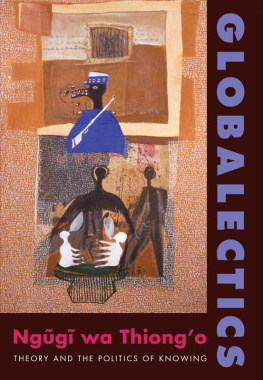

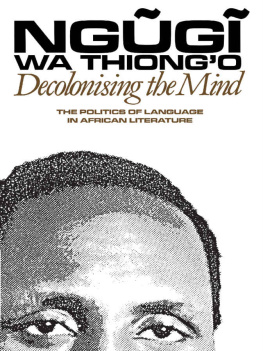
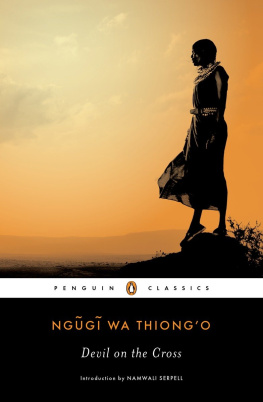
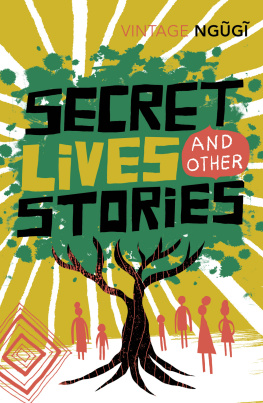
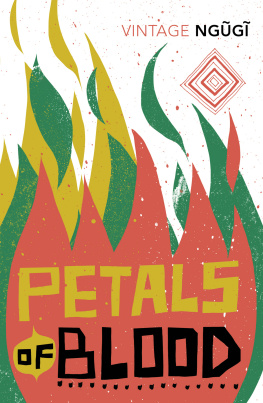
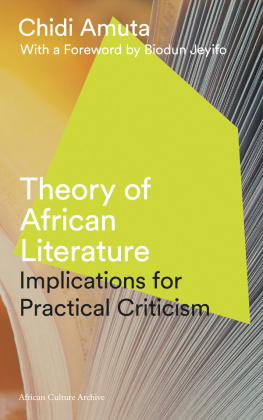

 Columbia University Press New York
Columbia University Press New York